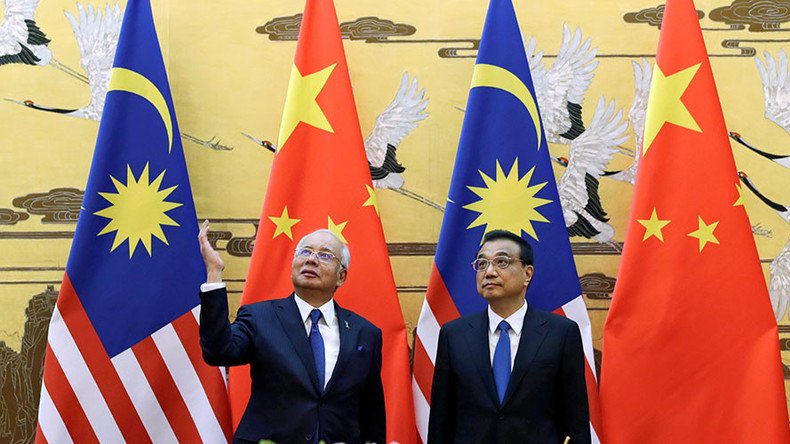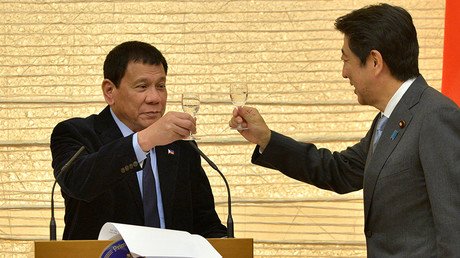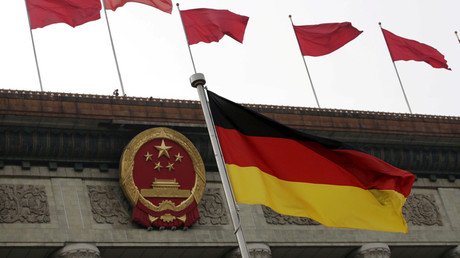Malaysian PM hits out at ‘lecturing ex-colonial powers’ amid China visit

Former imperial powers are in no position to lecture ex-colonies, the Malaysian prime minister has said during a trip to China. Najib Razak is on a week-long visit to sign deals on business, infrastructure development and defense cooperation.
Najib's visit to Beijing follows that of Philippines President Rodrigo Duterte, who stated that his country will be distancing itself from the United States and developing closer ties with China. The Philippines is a former US colony while Malaysia used to be under British rule.
Najib voiced the criticism in an editorial published in the state-run China Daily, in which he said larger countries should treat smaller ones fairly.
“This includes former colonial powers. It is not for them to lecture countries they once exploited on how to conduct their own internal affairs today,” the Malaysian leader wrote. “Malaysia and China are united in agreeing on the need to defend the sovereignty of the nation state and in the belief that the individual histories, values and governance systems of different countries must be respected.”
“It is crucial that global institutions reflect the legitimate desires and viewpoints of countries that were given no say in the legal and security infrastructure that was set up by the victors of the Second World War,” he added, saying that the new world needed new global institutions such as the 57-member Asian Infrastructure Investment Bank, which excludes the US and its Asian ally Japan.
READ MORE: Obama trade chief says TPP may still pass Congress after elections – report
The comments come as Najib stands accused of embezzling $3.5 billion from the strategic investment company 1MDB, according to a lawsuit filed by the Justice Department, which in June seized more than $1 billion in assets allegedly purchased by the prime minister’s relatives and associates with stolen money. Najib has denied any wrongdoing and said the scandal was concocted by foreign forces.
China has been Malaysia’s biggest trade partner since 2009, with trade reaching some $100 billion last year. Chinese companies are involved in several high-profile investment projects in Malaysia, including construction of an underground city under Kuala Lumpur and a deepwater port at Melaka.
The two countries are currently strengthening ties on the military side as well, with Malaysia purchasing littoral mission ships from China in a deal signed on Tuesday. The agreement was part of a $34.4 billion package sighed during Najib’s visit, which also includes a railroad line connecting Singapore and Kuala Lumpur.
The ship purchase, under which two warships will be delivered from China and two more produced in Malaysia with Chinese technology, is the first major defense agreement between the two nations. It was signed despite the tension the two countries have from overlapping territorial claims in the South China Sea.
“When it comes to the South China Sea, we firmly believe that overlapping territorial and maritime disputes should be managed calmly and rationally through dialogue, in accordance with the rule of law and peaceful negotiations,” Najib wrote in the editorial.
Opposing China’s territorial claims is one of the cornerstones of America’s Asia-Pacific policy. The US has been sending warships and warplanes to pass through the Beijing-claimed space in what is termed “freedom of navigation missions.”
As an increasing number of Asian countries are apparently drawn closer to China, the US State Department has tried to downplay the importance of such ties.
“And this idea that people are turning away from the United States and turning to China I think is just not borne out by the facts,” State Department spokesperson John Kirby said. “Everywhere we go in the Asia Pacific region it’s reiterated time and time and time again how important foreign leaders there view American presence, American economic assistance and participation and trade, as well as American leadership.”
But when confronted with a list of Southeast Asian nations becoming friendlier with China, which also included Thailand, Cambodia and Laos, Kirby retorted: “Okay. So we have two or three, four, whatever. There’s a lot of nations in the Asia Pacific region.”
“There’s only 10 in ASEAN,” was the reply, referring to the Association of Southeast Asian Nations, a regional economic organization of major nations in the area, which includes the five countries mentioned.














